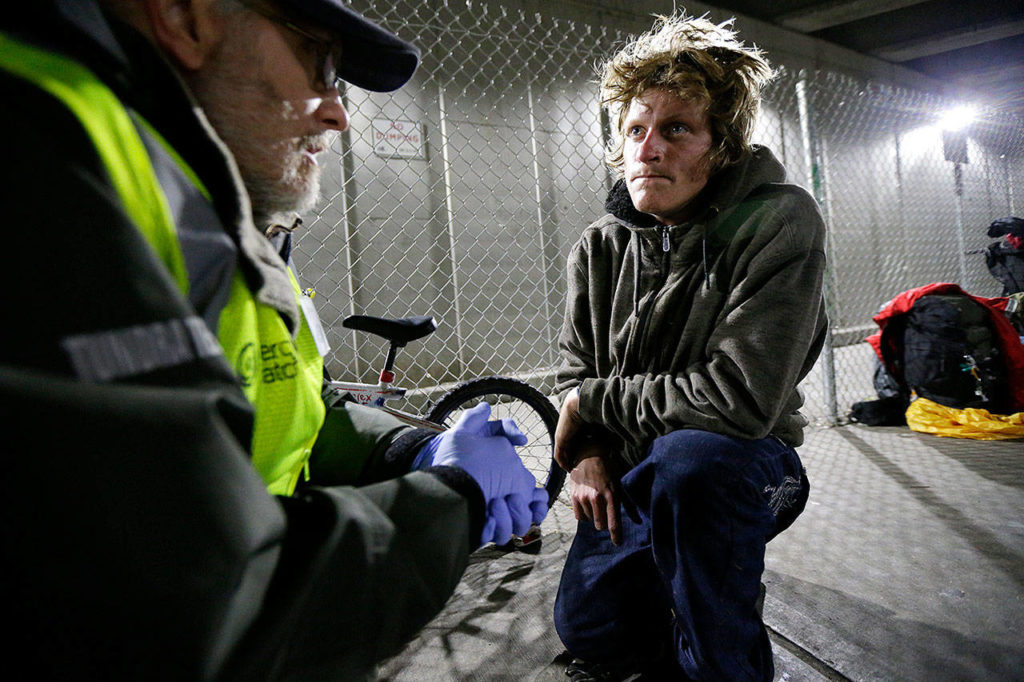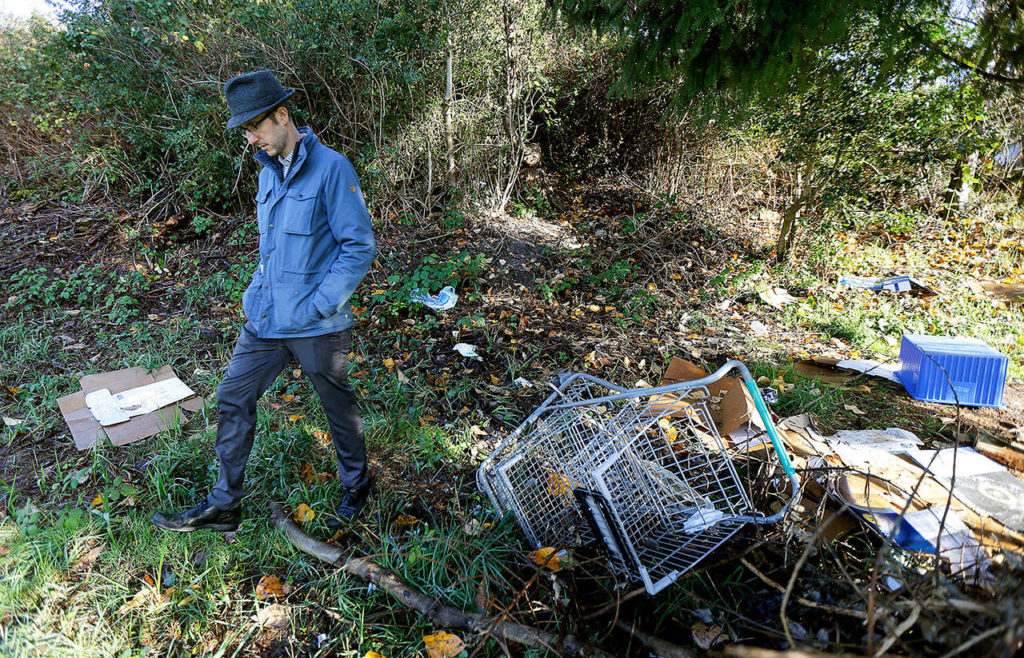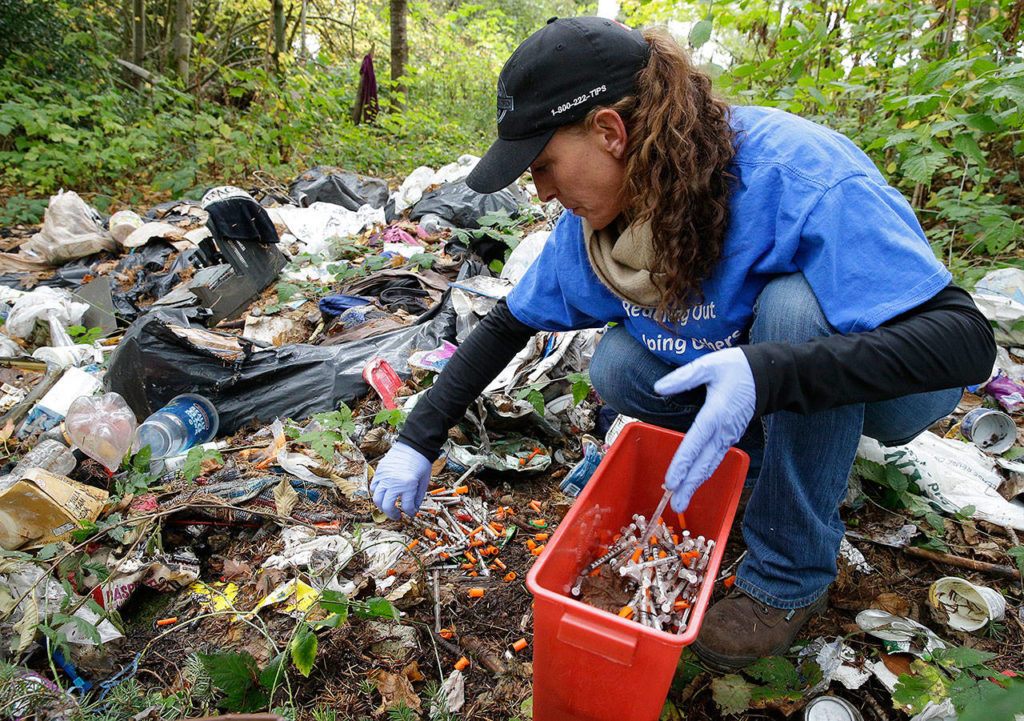Editor’s note: This story was distributed nationwide. It highlights efforts here to tackle chronic homelessness and the related problems of addiction and mental illness. We have added relevant links to the Herald’s coverage of those problems.
By Phuong Le / Associated Press
EVERETT — This is the lesson that the working-class city of Everett has learned: It takes a community to rescue the hardcore homeless.
It takes teams of outreach workers — building relationships with men and women struggling with addiction or untreated mental illness, prodding them to get help. It takes police and other agencies, working together to provide for their needs.
And it takes a prosecutor who was tired of managing the unending cycle of homelessness — jail-street-jail-street-jail. Hil Kaman left his job prosecuting the homeless and took up the challenge of finding solutions. For starters, he helped put together a team that would track the 25 most costly and vulnerable cases, and hover over each one individually until he or she was in treatment or housing.
“It was when everything else seems to have failed,” said Kaman, who became the city’s public health and safety director 17 months ago.
“They’ll bring someone to jail several hundred times, bring someone to the emergency department dozens of times — the (people) resistant to treatment and other alternatives. It was a call to say, ‘Isn’t there anything else that we could do?’”
In two years, Everett’s specialized team has found some form of housing for 14 chronically homeless people on its by-name list. The city’s newly formed community outreach enforcement team has gotten more than two dozen people into long-term treatment, primarily using beds paid through a partnership with a nonprofit that helps officers deal with the opioid crisis. The city also set up a flex fund that accepts private donations to help pay for motel rooms, bus tickets and other costs.
It’s among an array of strategies the city has tried. There is still much work to do: Everett, a city of 110,000 north of Seattle hard-hit by the opioid epidemic, and surrounding Snohomish County saw a 65 percent jump in people living outside between 2015 and 2017 — one of the largest increases on the West Coast in that period, according to a one-night count earlier this year.
The number of unsheltered chronically homeless — those who have been homeless for longer than a year while struggling with a serious mental illness, substance use disorder or physical disability — has grown steadily in the Everett region, more than doubling since 2015. That’s even as the city and county added more supportive housing.
Kaman and others say a combination of the opioid epidemic, poverty, lack of unskilled jobs, rising rents, and a shortage of affordable housing have made it even harder for those who fall into homelessness to get out.
The problem is not limited to Everett; up and down the West Coast, the high cost of housing has forced thousands of people to live on the streets, a trend that opioids have exacerbated.
“These are expensive places to live. It’s expensive for everybody. But the burden falls the hardest on people with the biggest problems,” said Steve Berg, vice president for programs and policy with the National Alliance to End Homelessness.
Everett sues over opioids
In 2011, roughly one in every five opioid-related deaths in Washington state took place in Snohomish County. That was the peak, but heroin deaths remain high and deaths from synthetic opioids such as fentanyl are climbing. Last month, county officials partially activated its emergency coordination center, typically used for natural disasters, to respond to the opioid crisis. So far this year, health officials have collected 2 million discarded needles.
In this former mill town on scenic Puget Sound, where thousands of workers now assemble the newest Boeing airplanes, the crisis had become so dire that this year Everett city officials became among the first to sue the manufacturer of the painkiller OxyContin. The city blames Purdue Pharma for an addiction crisis that has overwhelmed city resources and deepened its homelessness problem.
Kaman joined the city’s mayor, police chief, city council members and others who drove to Seattle in September for the city’s successful argument that a federal judge allow its lawsuit against the drug manufacturer to proceed.
While that case works through the court, social workers and police officers are fanning out to find people camping under the freeway or living in RVs or the woods, to try to connect them to services. Many of them initially deflect treatment or are too ill to even know they need aid.
James McGee, a heroin addict who was living in his minivan on the streets, was among those who got help.
The 27-year-old started popping OxyContin prescription pills after a shoulder surgery. When the drug manufacturer changed its formula, he switched to cheaper heroin. He first told himself he would never shoot up. Then he did.
“You draw that line, tell yourself you’re not going to pass that, and the next thing, you do,” McGee said. “Then you keep going and going. Before I know it, I’m sticking needles in my body, doing heroin and meth every day.”
He eventually lost his job at Costco and his apartment. Shortly after overdosing in the parking lot last summer — and being revived by someone who had overdose-reversal spray at hand — McGee walked into a police station and pleaded for help. Kaitlyn Dowd, a social worker embedded with Everett police, helped connect him to treatment about 100 miles away.
Now he’s living in sober housing, more than 90 days clean, working a construction job and attending as many recovery meetings as possible. “I never thought I would taste recovery like this,” he said. “Everyone deserves a second chance.”
Low-barrier housing
For every person who finds a treatment bed or permanent supportive housing, many more wait. Until this summer, when a second facility opened, the county had only 16 publicly funded detox beds for its 785,000 residents. Many must go out of the county, or even state, to find beds.
Experts say lack of on-demand treatment and a shortage of appropriate housing to meet specific needs are among the biggest barriers to helping people off the streets. Without permanent housing, advocates and city officials say the homeless will end up back on the street after completing their treatment, repeating the cycle.
Kaman said the city has been moving the chronically homeless into private rental units using vouchers, but the region’s low vacancy rate makes that much more challenging.
That’s part of the reason Everett is pushing ahead with a low-barrier permanent supportive housing project on city land. The project with Catholic Housing Services will house 65 chronically homeless people without first requiring they be addiction-free or deal with other issues. Residents will have access to mental health, recovery and other services and around-the-clock on-site staff.
Studies have found that such housing can save taxpayer money when compared to the costs of serving chronically homeless in emergency rooms, shelters and jails.
But so many chronically homeless people in the Everett region are on the waiting list for housing that those units will fill up when it opens in 2019.
“Housing is as, if not more, important than any medication” or other services, said Tom Sebastian, CEO of Compass Health, Snohomish County’s largest behavioral health provider.
His agency is developing an 84-unit housing project for mentally ill and addicted homeless on a vacant lot in downtown Everett.
Compass Health doesn’t typically develop housing, but “because there’s that shortage, we feel a driving sense to step into that breach to do something to help solve that problem,” Sebastian said.
For those who can get housing and services, stability can be a lifeline.
Garrick Heller, 35, who was diagnosed with paranoid schizophrenia, said he would be on the streets otherwise.
Several years ago, he was involuntary civilly committed because he posed a danger to himself or others. He spent time on the streets, in shelters and eventually at a locked psychiatric facility run by Compass Health. Over time, he gradually moved into more independent living situations run by Compass Health.
Now he lives in a small studio apartment, where he sleeps on an air mattress. He gets mental health counseling and other services within blocks of his home. A service helps him pay his bills and rent, which is one-third of the $735 he gets in monthly disability payment.
Heller said he regularly takes his medication and works hard each day to stick to his treatment plan. He plans on looking for a job soon and wants to pass his GED.
“Getting myself back to normal — that took a long time,” he said. “I’m determined to get better.”
A financial burden
Finding solutions to homelessness is expensive. Voters in the city and county of Los Angeles since last year have passed a pair of ballot initiatives that will raise about $4.7 billion over the next decade to pay for thousands of affordable housing units and homeless services.
In May, a nonprofit pledged $100 million to help San Francisco cut its number of chronically homeless in half in five years by creating more permanent housing and increasing mental health services.
In Sacramento, where the number of people living on the streets has soared 116 percent over the past two years, the city and county last month agreed to spend tens of millions of dollars to coordinate services for those with mental illness and substance abuse problems. Steering them toward permanent housing is a cornerstone of the new effort.
And last month, King County, which includes Seattle, partnered with the Ballmer Group and others in a new program that will pay incentives to agencies that provide outpatient treatment on demand.
The hardcore homeless represent a major financial burden on Everett, putting pressure on the jail, emergency room and other services. In one extreme example, officials estimated one person used about $500,000 in such resources in one year. Another homeless man spent 800 nights in jail over eight years for trespassing and other nuisance crimes.
Hard cases resist easy solutions, but Everett’s team persists.
Teams try to serve people where they are — in streets, in the woods or under freeways. Volunteers with The Hand Up Project, many of whom are recently homeless and recovering addicts, have been hitting familiar haunts to find others who might be ready for recovery.
One rainy day, they found Robart Blocher, 34, living high up in the trees in a two-story fort he built out of discarded materials. He is addicted to meth, he said, and suffers from social anxiety disorder and other mental health issues, making it hard for him to go to places and seek help.
He used to make $14.50 an hour as a chef until his addiction, a series of bad choices and medical issues forced him to find shelter in the woods. He had been living in a basement apartment, but got kicked out when his roommate died. Then he moved into a trailer and couch surfed. He eventually lost his job.
A recent report found there is nowhere nearby where someone working a full-time minimum-wage job could afford an apartment that was not subsidized or shared with others, and that’s Blocher’s experience: “Nowadays, no way,” he said.
When the outreach team approached Blocher, offering to help him into treatment, he seemed receptive. He said he needed a mental health evaluation — but he had to deal with other stuff first.
The volunteers back off, for now. They will return.
Persistence pays off
In the past, Hil Kaman had prosecuted 38-year-old Joshua Rape. For years, his life has been a revolving door of jail stints, shelters and couches, and street-wanderings.
A specialized team of mental health professionals, housing and recovery experts, social workers, jail staff and officers worked to build a relationship with him. There were times when he’d tell them he wanted to get better but then he would disappear: “I was pretty evasive and elusive,” Rape recalled.
Opioid outreach specialist Amy Austin kept after him.
“She was all over me,” he said, recalling how she went searching for him a year ago when he missed an appointment after relapsing.
“I just wanted him to know that he could always come and find me,” she said.
When he decided in jail this fall that he was ready for treatment, the team got him into a motel until a slot opened up. They took turns checking in daily as he waited more than a week for a treatment bed. In October, they drove him to catch a bus to the recovery center 200 miles away.
“We’ve all been counting down the days until he’s been ready. We’ve tried so hard to get him engaged,” said Dowd, the social worker. “We’ve known him for a long time. We all want to see him being successful.”
Now he’s back in Everett, having wrapped up 30 days of inpatient treatment. He goes to outpatient treatment and recovery meetings several times a week.
For the first time, the man who has been homeless for six years will have his own place — a one-bedroom apartment that he’ll move into this month, using a housing voucher.
“I had to make multiple attempts at doing this,” he said. “But it’s working out. It can be done. You have to work for it.”
Associated Press writer Geoff Mulvihill in Cherry Hill, New Jersey, contributed to this report.
Talk to us
> Give us your news tips.
> Send us a letter to the editor.
> More Herald contact information.






























